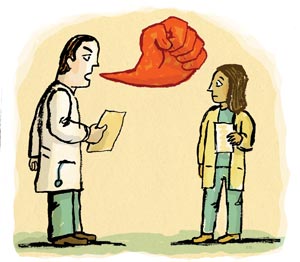Gossip Can Make or Break the Treatment Team
by Teddi Fine
Trust, important in every workplace, is critical in the hospital, where working relations can help or harm very sick people. How can this kind of trust be assessed? What issues are most likely to break or promote trust in the highly charged pediatric critical care environment?
Seeking answers, JHUSON associate professor Cynda Hylton Rushton, PhD, RN, FAAN, Instructor Phyllis Naumann, MSN, RN, and colleagues explored the issue of trust among doctors and nurses working in just that setting. [“Application of the Reina trust and betrayal model to the experience of pediatric critical care clinicians,” American Journal of Critical Care, July 2010.] The administered trust-betrayal model explores three kinds of trust: contractual trust (following through and keeping promises); competence trust (recognizing others’ abilities and knowing one’s own limits); and communications trust (honesty, respectfulness, speaking with good purpose).
Each kind of trust is important, but the role of one may be amplified in some situations. In the sample of health profes-sionals, both contractual and competence trusts ranked high. Communications trust was the greater challenge, primarily due to one factor: gossip.
Rushton observes, “We need to cultivate relationships and improve our capacity for trust—both within and across teams and systems. After all, trust is the foundation of quality healthcare.”

 Lateral Violence in the Workplace
Lateral Violence in the Workplace A Badge of Pride
A Badge of Pride Crucial Conversations
Crucial Conversations Staff Behaving Badly
Staff Behaving Badly The ‘411’ for Oncology Patient Care
The ‘411’ for Oncology Patient Care







